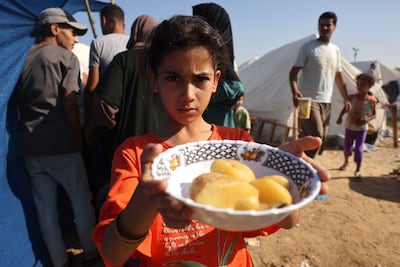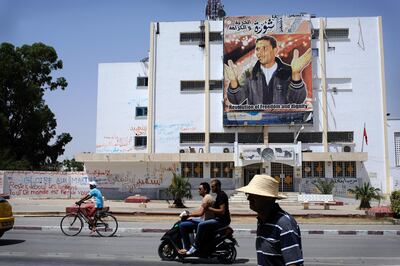In late September and the first few days of October, groups of young Palestinian men from Gaza launched protests on their shared border with Israel. The demands of the protesters were simple – and almost quaint, given the brutality of the past three weeks. They wanted Israel to grant greater access to border crossings so they could make it to their jobs in construction or retail – jobs that paid considerably more than the scantily available ones in Gaza. They wanted simply to make a living.
The story of the Gaza Strip of the past decade and a half – ever since Hamas took control in 2007 – has been one of accelerating decline in everything from jobs to living standards to health indicators. The only charts moving up in this era have been unemployment and poverty. The simple act of making a living is a Herculean task in Gaza, where residents are subject to a double blow: a significant blockade by Israel and poor governance, corruption and mismanagement by Hamas leaders.
It is impossible to know if those young men demanding to cross the border sympathised with Hamas, but one thing can be said for certain: young men and women across Gaza faced a bleak future even before the Hamas terror attacks of October 7, and face an even bleaker future today on the eve of an Israeli ground invasion and amid the rubble of multiple air strikes that has killed thousands of innocent civilians and destroyed large swathes of infrastructure.

A raft of UN reports outlined the dire situation before October 7. Youth unemployment in Gaza stood at around 64 per cent, among the worst in the world. Eighty-one per cent of the population lived below the poverty line and 80 per cent were dependent on humanitarian assistance. According to the UN, a third of all households in 2022 faced “catastrophic” or “extreme” levels of need. All of these numbers had deteriorated since Hamas took over and the Israeli blockade began.
While these numbers paint a harsh landscape, it should go without saying that no amount of economic and political pain justifies the brutal atrocities committed by Hamas militants on October 7, and all decent humans should mourn the loss of Israelis and Palestinians killed over the last three weeks.
What's more, the economic pain should not be linked to the Hamas militants' rampage. A wide range of surveys of Arab and Palestinian youth and my own travels across the region for more than two decades has revealed a fundamental reality: most young Arabs shun extremism and terror, and simply seek a life of dignity and opportunity and the satisfaction and sustenance of a decent job and playing a productive role in society. When those pathways are blocked, the vast majority of young Palestinians – or other Arabs or Iranians or fill-in-the-blank nationality – seek to emigrate elsewhere or simply live lives of squandered potential.
In one of the most pathos-laden scenes of Alaa Al Aswany’s emotionally searing 2004 novel, The Yacoubian Building, a weary-beyond-her-years teenager, Busayna, offered her friend Taha some advice that would ring true to many young Arabs of North Africa, the Levant or the Palestinian territories today. Taha was angry that he was refused entry to the Cairo police academy due to his father’s lowly status, but Busayna told him his anger was useless and he should “go off to an Arab country and earn some money, then come back here and live like a king”.
She continued: “This country doesn’t belong to us, Taha. It belongs to the people who have money. If you’d had 20,000 pounds and used them to bribe someone, do you think anyone would have asked about your father’s job? Make money, Taha, and you’ll get everything but if you stay poor, they’ll walk all over you.”
There was wisdom and cynicism and hopelessness in those words, and they sadly still contain resonance today, particularly in the Gaza strip and even the West Bank where jobs are doled out to those with factional connections to Hamas or the Fatah movement.
Busayna’s resigned counsel to Taha urging him to leave his home country for a better life elsewhere is not just the stuff of fiction. According to the 2023 Arab Youth Survey, more than half of youth in the Levant and North Africa are considering leaving their home country for better opportunities.
“The desire to emigrate,” the survey noted, “corresponds with the bleak economic outlook in many Arab nations. Nearly three-quarters (72 per cent) of young Arabs in the Levant (Iraq, Jordan, Lebanon, Palestinian Territories, Syria and Yemen), and about two-thirds (62 per cent) in North African countries surveyed (Algeria, Egypt, Libya, Morocco, Sudan, South Sudan and Tunisia) said their national economy is going in the ‘wrong direction’.”
A close look at the results of 15 years of the Arab Youth Survey suggests that most young Arabs – including Palestinians – are not interested in grand revolutions or spouting the latest ‘ism’. Their goals are modest: a job, an income, a chance to get married, to build a family, normality, dignity, hope. Their expectations of government are also modest: help the people, manage the country efficiently, reduce corruption, provide basic security. Too many regional governments fail these modest aspirations of their people.
Years of economic underdevelopment creates sets of social and political pathologies that are difficult to contain with each passing year. Let us remember the words of Mohammad Bouazizi, the Tunisian fruit and vegetable vendor who lit himself on fire in December 2010 after his license was confiscated, crying out: “how am I supposed to make a living?”

That act of self-immolation in Tunisia helped unleash a tsunami of grievances in several regional countries, spawning the decade of unrest, which some commentators called the “Arab Spring”, though it certainly does not feel like “spring” in Syria or Libya or even Tunisia, where youth unemployment levels stand roughly where they were at the time of Mr Bouazizi’s death. Indeed, across the region today, many youth face the same economic challenges they did in the beginning of the uprisings.
There are tens of thousands of Bouazizis in Gaza today, and that basic question – “how am I supposed to make a living?” – is about to become even more difficult to answer as Israel prepares for a ground invasion.
Live updates: Follow the latest news on Israel-Gaza


